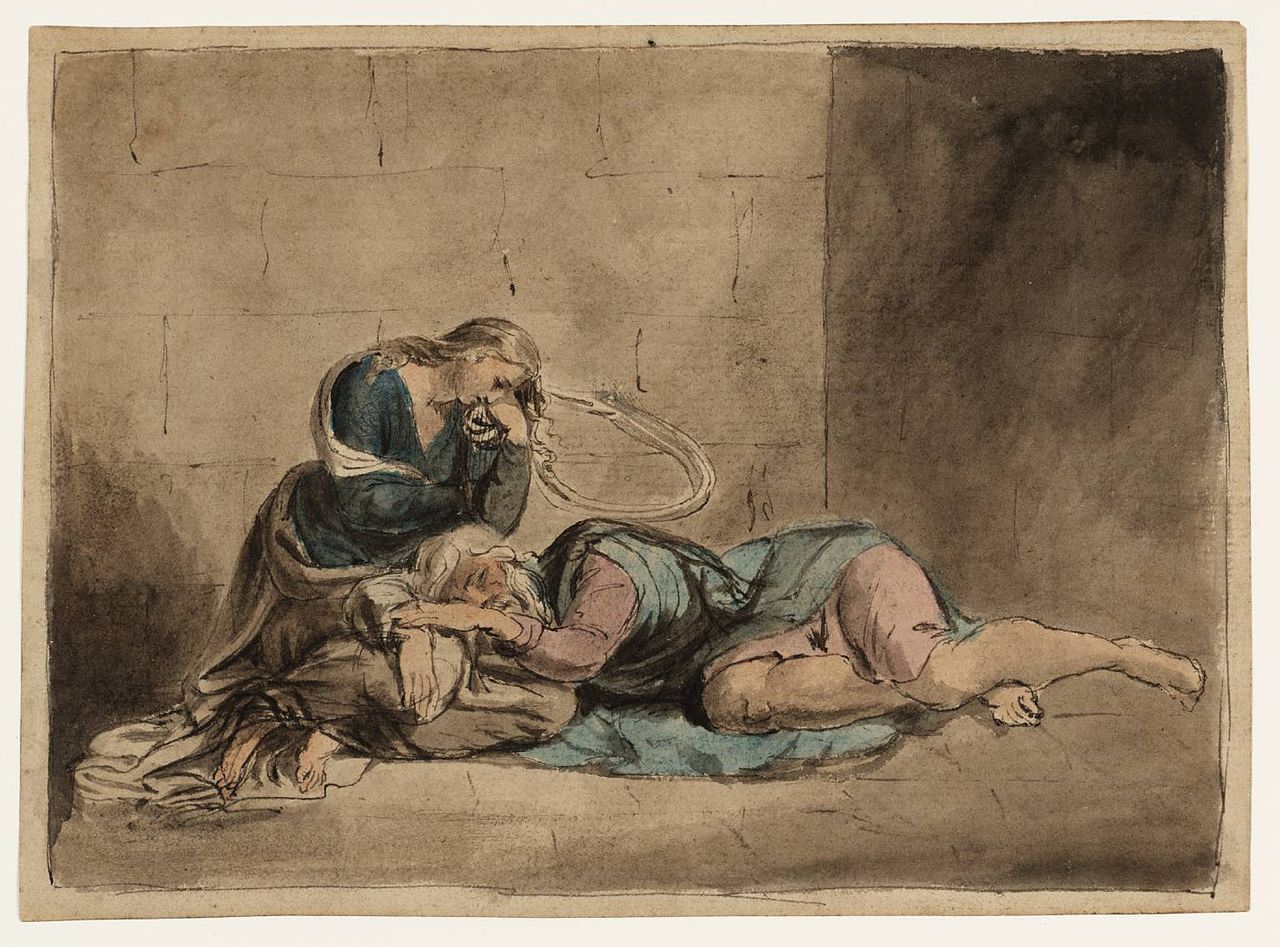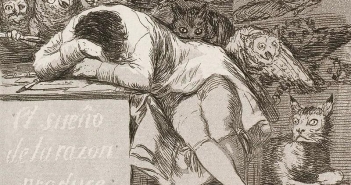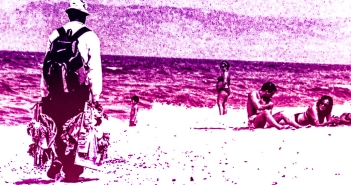As a barrister I am given to quoting from Shakespeare’s plays in closing speeches. This may seem pretentious, but I find his acute observations on the human condition continue to speak to juries, and judges. He remains highly relevant to legal education, and indeed the practice of law. I would go so far as to say that a good knowledge of his work provides a real advantage to any practitioner.

William Shakespeare’s Birthplace.
Stratford-upon-Avon
Recently, I was delighted to have the opportunity to appear in a rare in-person trial in Royal Leamington Spa, which is in Shakespeare’s home county of Warwickshire. I recalled John Betjeman’s poem about dying in the town, whose name conjures images of Bertie Wooster on a bucolic retreat:
oh, you know that the stucco is peeling.
Do you know that the heart will stop?
From those yellow Italianate arches
Do you hear the plaster drop?
Times have changed. To my chagrin, Leamington Spa is not actually a spa town – any longer at least – but is just a short hop from Stratford-on-Avon, Shakespeare’s birthplace, where I stayed for the duration of proceedings.
The house where Shakespeare was born was previously an ale house and is now a museum. Nearby, in The Holy Trinity Church, lies his grave, which contains a stern warning that his bones should remain in situ.
Unfortunately, the well-preserved Anne Hathaway House was closed for the duration of my stay, but the exterior and gardens were at least visible. Likewise, the complex of theatres – home to the Royal Shakespeare Company – were also no go in this bleak period for the performing arts.
Shakespeare himself often confronted the closure of puppet shows for sowing subversive ideas as Puritanism gained ground, as documented in James Shapiro’s, 1599 A Year in the Life of William Shakespeare (2005) and 1606: William Shakespeare and the Year of Lear (2015).
Shakespeare’s era was marked by recurring plague, tyranny and civil strife, themes according to Stephen Greenbelt’s Tyrant: Shakespeare on Politics (2018) the Bard approached obliquely, for fear of persecution. Under conditions of tyranny, public art may still be an outlet for mockery of the powerful. Thus we find in Percy Bysshe Shelley’s ‘Ozymandias’
Half sunk a shattered visage lies, whose frown,
And wrinkled lip, and sneer of cold command,
Tell that its sculptor well those passions read
In what follows I recite some of Shakespeare’s lines that inform my understanding of our present world.
Neither a borrower nor a lender be. (Polonius, Hamlet)
In the light of the bailing out of toxic banks – socialism for the mega rich – and the infliction of austerity, being indebted now brings serious dangers. With so much crime linked to social exclusion and poverty, it is as if we are returning to an era of Debtors’ Prisons, ubiquitous in Shakespeare’s day.
The late David Graeber’s excellent book Debt: the First 5,000 Years (2011) precisely illustrates how debt, and now student debt in particular, is creating a permanent rentier class with no educational outlet for upward mobility, and low prospects of home ownership, at least for those who don’t have access to the bank of Mum and Dad.
The power of bankers in contemporary society should lead to consideration of The Merchant of Venice, which, apart from dreadful antisemitism – Shakespeare often expressed the prejudices of his day – provides a searing attack on the sin of usury, the existence of which is conveniently ignored by far right Christians today.
In the play, Portia (Bassano’s betrothed who finds himself in a spot of bother after taking on a debt on unfavourable terms from Shylock) presents herself in court, disguised as a male lawyer, and pleads for mercy against the enforcement of the bond, which is the extraction of a pound of flesh.
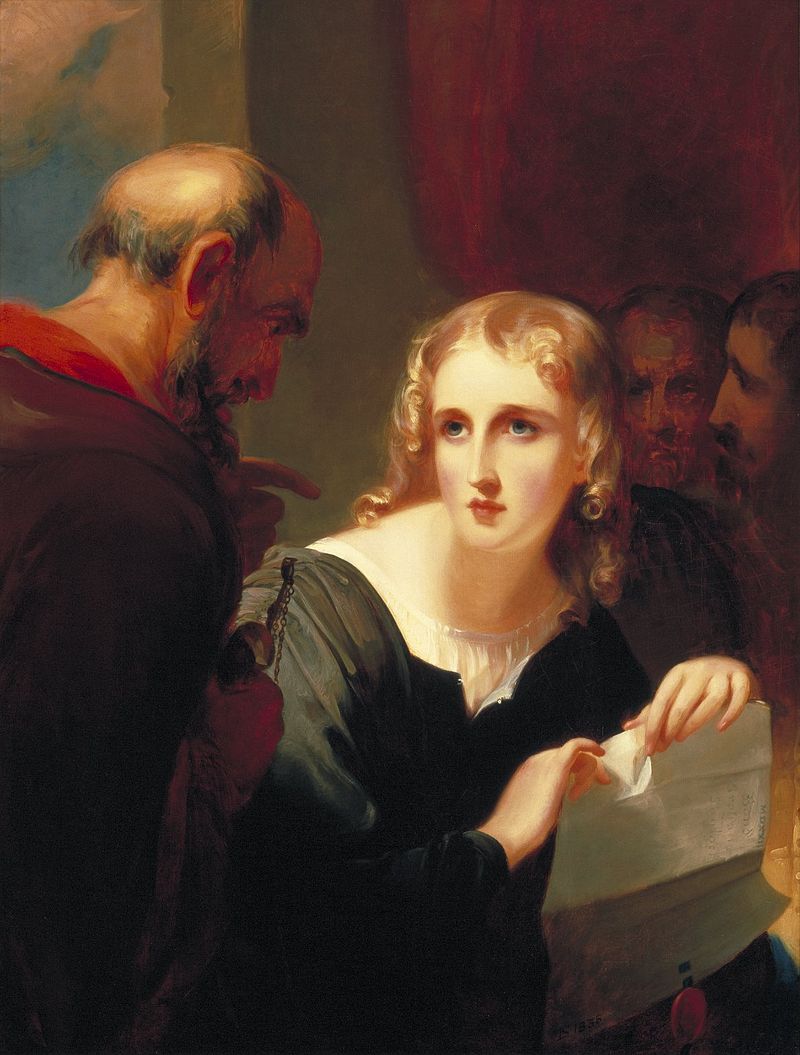
Shylock and Portia (1835) by Thomas Sully
In a famous passage she argues:
The quality of mercy is not strained, it dropped as the gentle rain from heaven upon the place beneath: it is twice blessed, it blessed him that gives, and him that takes, tis mightiest in the mightiest, it becomes the throned monarch better than his crown, His sceptre shows the force of temporal power, the attribute to awe and majesty, wherein doth sit the dread and fear of kings: But mercy is above this sceptred sway, it is enthroned in the heart of kings, it is an attribute to God himself; and earthly power doth then show likes god’s, when mercy seasons justice…
Shylock responds with a narrow vision of justice that sadly is all too familiar in our time of dispossessions:
I crave the law, the penalty and forfeit of my bond.
Portia then shifts ground and cleverly argues that the bond should be enforced but:
The bond gives thee there no jot of blood – The words expressly are a pound of flesh … Then take they bond, take thou thy pound of flesh, but in the cutting it, if thou dost shed one drop of Christian blood, thy lands and goods are by the laws of Venice confiscate … For as thou urge justice, be assured, thou shalt have justice more than thou deserts.
In this morality tale, therefore, Shylock – unlike our contemporary bankers in most cases – is forestalled in his extraction of the pound of flesh. If only such arguments against the extraction of financial flesh were available to barristers defending the disposed today.
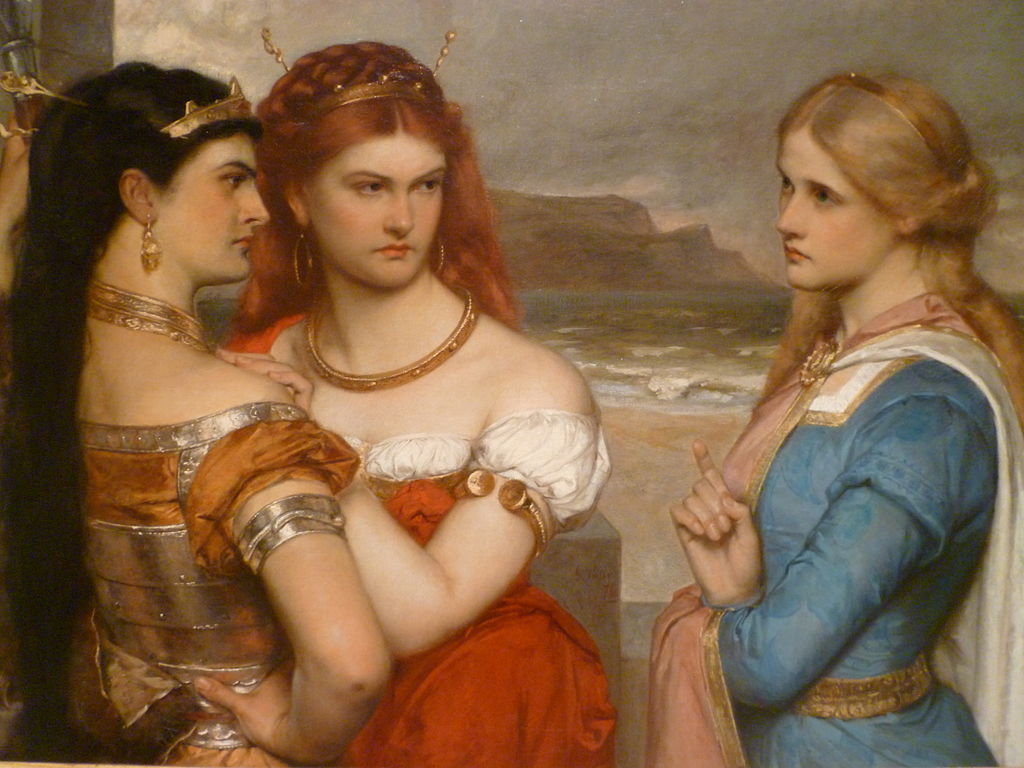
Three daughters of King Lear by Gustav Pope
The True Criminals
So who are the true criminals today? Shakespeare offered an answer through the medium of the wise Fool in Kind Lear:
What art mad. A man may see how this world goes with no eyes. Look with thine ears see how yon justice rails upon yon simple thief. Hark in thine ear, change places, and handy dandy, what is the justice which is the thief.
Governments bail out Goldman Sachs and other banks. There are no repercussions for their reckless lending, save in Nordic countries like Iceland. But If Jean Valjean steals a loaf of bread, they pursue him to the ends of the Earth to extract the pound of flesh.
Similarly, if you become a whistle-blower and reveal the machinations of the powerful such as Julian Assange, then you are turned into a criminal, while Messrs Blair, Kissinger, and indeed Varadkar, are never forced to face the music.

Amanda Knox
The lady doth protest too much, methinks, (Hamlet, Act 3, Scene 2).
Stacey Schiff’s Witches: Salem 1692 (2015) observes how the hysteria of witch hunts appear to represent a sublimation of pre-existing grievances, and envy. This remains the case for modern day witch hunts such as that directed against Amanda Knox, which have been highlighted by the Innocence Project.
The book makes clear that children can be manipulated into holding false belief, even to the extent that they incriminate themselves. False allegations are also linked to hysterical parents or authority figures. As occurred in Amanda Knox’s case, young minds are easily turned to mush by persistent questioning, fear of authority, and interaction with nefarious police officers and social workers.
This is what is referred to as falsely implanted memory syndrome, on which subject Elizabeth Loftus and Maggie Bruck are experts.
Categorising someone as a witch or a warlock also reflects jealousy if that person holds a gift you do not possess. Seen in Freudian terms, it is a form of transference of perceived inadequacies.
All that glisters is not gold. (The Merchant of Venice, Act 2, Scene 7)
This zeitgeist is one of post-truth amorality, a phenomenon with long antecedents. In King Lear we hear that ‘a scurvy politician seems to see the thing thou does not’; while Henry VI speaks of: ‘Stuffing the ears of men with false reports’, which seems curiously relevant to Covid Times.
Purveyors of nonsense and incomprehensible prose – the structuralists and post-modernists who took over the universities – represent a movement, or grouping, united in their rejection of universal values. Relativism leads to the dismissal of evidence, rationality, science, rigour, precision and all the integrative forces that tie society together, as Noam Chomsky has observed: ‘if I am missing something, then show me what it is, in terms I can understand.’
 The first point to note about the post modernists nonsense is that it has encouraged a distrust of the truth and an atmosphere of looseness and imprecision, wherein any old argument, or moral position, is accorded equal weight.
The first point to note about the post modernists nonsense is that it has encouraged a distrust of the truth and an atmosphere of looseness and imprecision, wherein any old argument, or moral position, is accorded equal weight.
In 2005 the late David Foster Wallace observed that this created an epistemic free-for-all in which any truth is seen from the vantage of perspective and agenda.
Relativistic and structuralist ideas such as the indeterminacy of texts, alternative ways of knowing and the instability of language fed into Trump and his aides saying that every word he utters should not be taken literally. Just as a text by Derrida could contradict itself, similarly Trump can jump from one inconsistency to the next.
The work of The Innocence Project is littered with examples of perjured evidence, false and fabricated claims and cognitive and confirmation bias by experts or pseudo experts, which have led to wrongful convictions. All too many innocent people are incarcerated on the basis of lies. With the embrace of subjectivity, we are celebrating opinion over knowledge, feelings over facts.
Confirmation bias applies where people rush to judgment, and give into their prejudices, rather than evaluating evidence.
According to Evan Davies in his recent book Post Truth, one aspect of all this bullshit is a desire to believe something unreasonable to be true. Pope Francis sagely remarked that ‘There is no such thing as harmless disinformation: trusting in falsehood can have dire consequences.’
There is no such thing as harmless disinformation; trusting in falsehood can have dire consequences.
— Pope Francis (@Pontifex) January 24, 2018
To thine own self be true, and it must follow, as the night the day, thou canst not then be false to any man. (Hamlet, Act 1, Scene 3)
In general, social media is weaving a web of deceit and destroying the social fabric through lies, disinformation, smears, and character assassination. Pierre Omidyar a founder of eBay argued that the monetization and manipulation of information is rapidly tearing us apart.
Trolls and bots were unleased by Trump, Bannon, and Cambridge Analytica to spread disinformation in the U.S presidential election, undermining democratic institutions and fact-driven debates.
Now the social media platforms have moved on to shilling for Big Pharma – laying the ground for a Screen New Deal – while shutting down alternative assessments of the pandemic, and unprofitable treatments.
It leads me to an unhappy conclusion that we increasingly developing a generation of technocratic fascist, selfish, materialistic ultra-conformists receptive to post-truth deception. The silos they occupy reinforce their prejudices. It is less important now to establish the truth than to ask whose side you are on.
As Cicero, a minor character in Julius Caesar remarks:
Indeed, it is as strange, disposed time but men may construe things after their fashion clean from the purpose of things themselves.
Lies in fact have become intrinsic to commercial and business interaction. In The People of the Lie (1983) Scott Peck contends that Evil is untruth, undermining life and liveliness. Such people operate by covert means. Evil people, Peck argues, scapegoat others, and cover up their misdeeds. They prevent the rest of us from making informed choices. Evil is also linked to a self-image of respectability and, as Peck defines it, the exercise of coercive power, often by authority figures. Evil is also surprisingly obedient to authority.
In contrast, in times of stress those who genuinely good people, even in times of acute stress, do not desert principles.
Hannah Arendt presaged our Brave New World.
The ideal subject for totalitarian rule is not the convinced Nazi or the convinced communist, but people for whom the distinction between fact and fiction (the reality of experience) and the distinction between true and false (standards of thought) no longer exists.
With her acute understanding and lived experience of totalitarianism, Hannah Arendt is perhaps the most important of the public intellectuals for our time.https://t.co/Uj2NbjUqsb#hannaharendt@broadsheet_ie @fotoole @wadeinthewate11 @PaulGilgunn @liamherrick @NMcDevitt
— CassandraVoices (@VoicesCassandra) March 25, 2021
Cry “havoc!” and let slip the dogs of war, (Mark Antony, Julius Caesar)
The film, Wag the Dog witnesses the beginning of a fake war. Today, apart from military engagements that are generally played out on our television screens – such as Iraq and Afghanistan – there are new types of fake wars. The War on Drugs is a smokescreen that obscures failure to deal with the root causes in poverty and austerity. Now the war on the virus – a disproportionate reaction to a significant but not overwhelming public health crisis – has generated unprecedented panic.
People are told to comply or face gruesome death. But how safe are we really in these circumstances? We will not be safe in authoritarian police states with restrictions on liberty, freedom of movement, privacy and associational or community ties. Nor will we be necessarily safe from a plethora of hastily tested pharmaceutical products, enforced by so-called vaccine passports.
How to subjugate the world population? Create a hyper real sense of emergency. Engender panic, leading to compliance and deference
Should we disassociate ourselves from the unvaccinated? Even putting it in these terms shows how admen dominate the discourse.
The disproportionate response to the pandemic represents a fascist creep. People are desensitized to loss of liberty once they are in fear of their lives, and increasingly dependent on the state for the pile of gruel it so generously provides, having removed any prospect of employment for hundreds of thousands in precarious work.
Meanwhile, the corporate law firms and mega rich have won big in our new version of disaster capitalism using Modern Money Theory to oil the chains of patronage.
Thus, whether centrally orchestrated, or more likely arising out a coalition of vested interests, and made possible through an increasingly uneducated, desperate and compliant population, COVID-19 has brought us the Shock Doctrine par excellence.

Procession of Characters from Shakespeare’s Plays. Artist unkown.
The evil that men do lives after them; The good is oft interred with their bones. (Mark Anthony, Julius Caesar)
The problem of evil in our times is embodied in extremism, fundamentalism, draconian laws, high consumerism, and the negation of the rule of law. Today, unselfish communal behaviour go unrewarded, while the innocent are framed.
What is left of compassion, sincerity, truth, community, and optimism? Well at least we can still find it in the poetry of Shakespeare.
Shall I compare thee to a summer’s day?
Thou art more lovely and more temperate:
Rough winds do shake the darling buds of May,
And summer’s lease hath all too short a date.
Sometime too hot the eye of heaven shines,
And often is his gold complexion dimmed.
And every fair from fair sometime declines,
By chance or nature’s changing course untrimmed.
But thy eternal summer shall not fade,
Nor lose possession of that fair thou owls.
Nor shall death brag thou wander in his shade,
When in eternal lines to time thou grow’s:
So long as men can breathe or eyes can see,
So long lives this, and this gives life to thee.
Put simply, love conquers all. Or should. The Bard of Avon has much to say in these troubled times.
Featured Image: Lear and Cordelia by William Blake.

